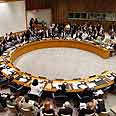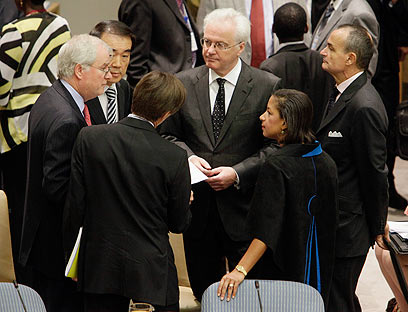
UN approves Iran sanctions
Twelve Security Council members endorse fourth round of sanctions against Tehran; Turkey and Brazil vote against proposal, Lebanon abstains; decision marks compromise between US demands, Russia's and China's conditions
Twelve states voted in favor of the decision to impose more sanctions on Tehran due to its unwillingness to prove that it does not seek to produce nuclear weapons. Turkey and Brazil voted against the decision, while Lebanon abstained.
Addressing the new sanctions, US President Barack Obama said, "Today, the United Nations Security Council voted overwhelmingly to sanction Iran for its continued failure to live up to its obligations"

Five permanent members reach agreement (Photo: AP)
"This resolution will put in place the toughest sanctions ever faced by the Iranian government," he said. "It sends an unmistakable message about the international community’s commitment to stopping the spread of nuclear weapons."
Iran slams 'wrong' measure
However, Iran's television rejected the new UN resolution as a "wrong" measure and that it would "further complicate" the situation. Tehran will not suspend its enrichment activities in the wake of the UN vote, a senior Iranian official said.
Brazil, which voted first, insisted that the uranium enrichment deal reached with Iran via Brazilian and Turkish mediation proved that that efforts to resolve the crisis diplomatically had not been exhausted yet.
America's UN Envoy Susan Rice said that the US Administration will continue to discuss Iran's uranium-enrichment offer, but stressed that the sanctions must be enforced as long as global concerns regarding Iran persist. Meanwhile, France said the door for dialogue remained open to Iran, expressing its hopes that Tehran will show cooperation in respect to its nuclear program.
The vote on the decision was delayed earlier after representatives for Turkey, Brazil, and Lebanon asked for more time in order to receive instructions from their capitals about whether to vote against the sanctions or merely abstain.
Israel lauds 'historic moment'
The sanctions decision marks the most serious step against Iran thus far in terms of economic moves and a weapons embargo. Western diplomats estimated that the proposal was the best that could be hoped for while avoiding Russian and Chinese objection.However, the move is far from Israel's expectations for sanctions on Iran's energy sector, its central bank, and the export of the Russian S-300 missile defense system.
However, Deputy Foreign Minister Danny Ayalon lauded the decision, referring to it as a "historic moment.
Referring to the objection of Turkey and Brazil, Ayalon told CNN history will judge the states according to their votes and whether they chose narrow and cynical interests, or the interests of peace and stability.
The five permanent members of the Security Council – the US, China, Russia, France, and Britain –agreed on a draft proposal this week in conjunction with Germany. The sanctions mark a compromise between the paralyzed moves sought by the US, the Russian demand that sanctions not harm the Iranian people, and the Chinese insistence not to undermine the recovery of the global economy, that is, China's economic interests.
News agencies contributed to the report










